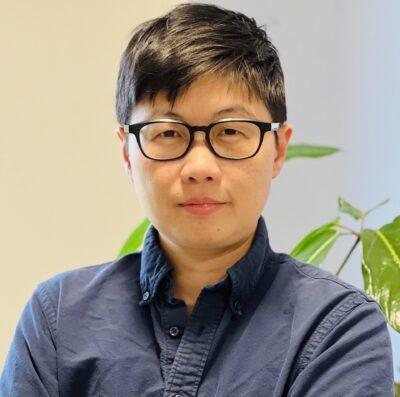Meet Dr. Tsai-Yi Lu, New Faculty Member in the Department of Neuroscience

Dr. Tsai-Yi Lu joined the Department of Neuroscience in the UVA School of Medicine in September 2023. Dr. Lu was previously at Johns Hopkins University. Enjoy Dr. Lu's thoughtful and interesting answers to our questions and join us in welcoming them to UVA!
Brain Institute: Briefly describe your current research projects and interests.
Dr. Lu: I am extremely interested in how different brain cells communicate with each other to maintain normal brain function and how this communication is disrupted during neurodegenerative diseases. My current research projects focus on a specific population of cells called oligodendrocyte lineage cells, which make up the largest number of non-neuronal cells in the brain and play critical roles in supporting neuronal health and function. I am particularly interested in understanding how these cells undergo changes in their normal physiological functions during Alzheimer's disease and aging.
What do you find to be the most exciting and inspiring area of emerging neuroscience research?
I have to say it's the interactions between neurons and glia, as well as among glial cells themselves. Glial cells make up half of the brain, but they have long been considered merely 'supporting cells' or 'space fillers.' However, thanks to the dedication of several pioneering neuroscientists and technological advancements, we have gradually come to realize that glial cells are also indispensable for the health and function of our nervous system. These diverse glial cells each possess unique characteristics waiting for more scientists to explore. What I've learned from this story is that we must always remain curious, open-minded, and willing to challenge the dogma in our field.
Why did you decide to come to UVA?
First and foremost, UVA provides a top-tier academic environment for research, without a doubt. What's even more important is that everyone I've encountered at UVA has been exceptionally sincere and friendly, always ready to lend a hand and collaborate. This is a valuable asset that is not often found in other places. Last but certainly not least, UVA fosters a highly inclusive environment where I can truly be myself and freely express who I am. So far, I can confidently say that coming to UVA was the right decision.
What's the best part about your job?
To me, conducting research is akin to being a detective. When faced with a scientific mystery, scientists employ rigorous methods to investigate, applying deductive reasoning, and sometimes relying on instinct, to arrive at conclusions that closely align with reality. Since I was a child, I've been a fan of Sherlock Holmes, so working in research feels like a dream from my childhood come true. Furthermore, when you make a novel breakthrough, you become the first person among all human beings to uncover it. It is also an irresistible thrill to me.
What led you to a career in neuroscience?
Initially, I was set on becoming a microbiologist and immunologist before entering graduate school. However, during a dinner conversation with some senior graduate students, I learned about this intriguing concept of the brain having its own defense system to combat pathogen invasions and clear harmful substances. This idea fascinated me, leading me to join Dr. Marc Freeman's laboratory to study it. And the rest is history.
What advice do you have for neuroscience trainees?
I believe that being open-minded, reading broadly, and not being afraid to take risks are valuable pieces of advice for trainees in any scientific discipline. However, for neuroscience trainees, I would like to emphasize an additional point: 'being compassionate.' While dedicating long hours in the laboratory, it's easy to lose sight of the real-life challenges that people are facing. As neuroscientists, with our deep understanding of the complexities of the brain, we should strive to be more compassionate in our approach and attitude toward the various mental health issues in society today.
What's something new that you've learned recently (at work or outside of work)?
I recently learned from the documentary "Of Medicine and Miracles," which was actually screened at UVA, that the multiple organ failures experienced by patients during the initial CAR-T cell therapy trial were attributed to the extraordinarily high concentration of a cytokine called IL-6. Beyond my work, I also recently discovered that a bull moose can shake its entire antlers off. Watching that footage truly blew my mind.
Where are you from originally?
I was born and raised in Taipei, Taiwan. It's this big bustling city surrounded by gorgeous mountains with beautiful rivers running through it. We have one of the best public transit systems around, and you'll find a touch of history pretty much everywhere you look. The people are warm and welcoming, and the city offers a diverse array of cuisines, including countless yummy street foods and, of course, the vibrant night markets.
What's your favorite way to spend a day off?
If it were just for a day, I'd likely take a long morning walk with my cat Rio (named after Dr. Pío del Río Hortega, who discovered the resident brain immune cells called microglia), experiment with some new recipes, enjoy a beer, and watch an excellent movie. Given a few more days, I'd undoubtedly seek out a beautiful hiking trail and camp nearby, preferably in an area with no cell phone reception.
What is a surefire way to make you laugh?
Quote any movie from the greatest comedian in the Hong Kong movie history, Stephen Chow.
Dr. Lu was hired as a part of the Grand Challenges Research Investments in Brain and Neuroscience. The Grand Challenges are a key component of the University's 2030 "Great & Good" Strategic Plan, a set of initiatives focused on bringing the University to preeminence in key focus areas while acting in service to society.